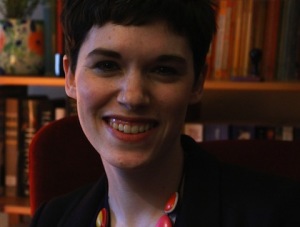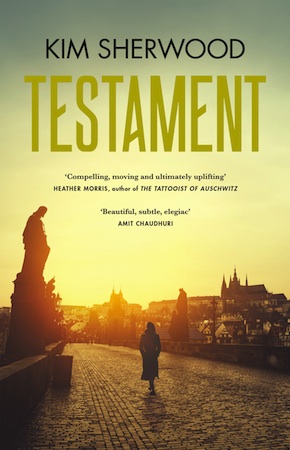Over the line
by Kim SherwoodAll writers should plant sleeper agents in bookshops, to be activated when their novel starts to peep over the parapet. I am fortunate to have the wonderful Mr B’s Reading Emporium just around the corner from me, and have been receiving coded signals about my debut novel, Testament. “It’s appeared on the system!” “It’s available to order!” “It’s arrived!” “It’s on the shelves!”
If you’re anything like me, this is invaluable for two reasons. First, because the rapid approach of publication day is hugely exciting, and second, because the rapid approach of publication day is almost equally nerve-wracking. My sleeper agent affords me a carefully adjusted aperture onto the world, from which I can watch at a safe nervous/excited distance as my novel transforms from a personal creation to a public co-creation. Meanwhile, as the UK goes football mad, I can go about my business, pretending to be far more invested in the results of the World Cup. The other day, I found a red sports day tape with ‘FINISH LINE’ printed in vainglorious optimism in a shop usually devoted to crockery. I stood holding it for a ludicrous amount of time, considering buying it to mark my publication day: the finish line.
Testament has been six years in the making. I began writing it after my grandfather, the actor George Baker, passed away, and I was unmoored by grief. Fiction has always been the echo chamber in which I read and write in order to know myself. After George died, writing allowed me to articulate how very lost I felt, and, slowly, find myself again. At that same time, my grandmother on my father’s side, who is Hungarian Jewish and a Holocaust Survivor, began to talk about her childhood experiences for the first time. I wanted to understand what she was telling me, so began researching the Holocaust in Hungary. My novel was built on the cracking foundations of grief, and horror at all I was learning. The story and characters grew the more I read. Testament is about the impact of the Holocaust on a family: Joseph Silk, a Hungarian Jewish Survivor who has buried his past and gone on to become one of Britain’s foremost painters, and his granddaughter, Eva, who is left in search of his history and identity after Silk dies.
For me, research and writing work in relationship, influencing each other. Testament took shape in archives, and in the footsteps of my characters. I was fortunate to receive help from Drs Rita Horváth and Kinga Frojimovics, who had recently collected together for the first time the 360 questions the Hungarian Committee for Attending Deportees asked returning Survivors from the camps and forced labour service. Rita and Kinga shared the questions with me, and the power of these questions searching to give language to the as-yet-unknown – “What other methods beside gas were used to kill people?” – and the slide from past to present tense – “How do you picture your future and have you any concrete plans?” – haunted me. The questions became the spine of the novel, running through the past and present timelines, binding 1944–1951 to today.
Research and writing work in relationship, influencing each other… Testament took life in the search for remnants, where the past and present meet.”
My writing took me across Europe: Berlin, Budapest, Belgrade, Prague and home, London and Lake Windermere. For me, site-based research is just as vital as archival research. After reading about the hostel in Prague that took in child Survivors of Theresienstadt, I sought it out, finding a pastel building in a tree-lined suburb, home to the largest Jewish community in interwar Czechoslovakia, most of whom did not return. The building is now a school, and a mother whose child attends nursery there tells me they have the highest proportion of leavers going to university in all of Prague. I walk from the school to the site of the synagogue, which was destroyed, leaving no trace behind. It was here that my character Zuzka worshipped and played.
In Budapest, I seek out an old school for disabled Jewish children, which became the receiving centre for the Hungarian Committee for Attending Deportees. It is now a branch of an American college, and there is almost no sign of the displaced people who slept in its corridors, waiting and hoping for news of their families. The door is open when I arrive, so I push inside, and stand in the beam of the stained glass. I close my eyes, and imagine Silk arriving here, shocked that beauty such as this still exists. Testament took life in the search for remnants, where the past and present meet.
In 2016, my partner, the writer Nicholas Herrmann, encouraged me to enter the Bath Novel Award. I could only be persuaded to submit the manuscript two minutes before the midnight deadline. As well as a bookshop sleeper agent, I’d suggest always having someone to believe in you when your own belief is shaky. I was incredibly lucky to win the award, and through that met my agent, the brilliant Sue Armstrong at C&W. That was the first step in making my private world public, and now here we are. I didn’t buy the ‘FINISH LINE’ tape, because I know it’s not the finish line really. It’s another beginning, and I am so grateful and excited to be sharing it with the people who helped me make it here. I announced, precociously, that I’d be a writer aged four. Writing is my whole identity. It remains hard to believe that my life’s dream has come true. Maybe I will buy that ‘FINISH LINE’ after all.
 Kim Sherwood was born in Camden in 1989 and lives in Bath. She studied Creative Writing at UEA, is now Senior Lecturer at the University of the West of England, and teaches prisoners. Her pieces have appeared in Mslexia, Lighthouse, and Going Down Swinging. Testament is published by riverrun in hardback and eBook.
Kim Sherwood was born in Camden in 1989 and lives in Bath. She studied Creative Writing at UEA, is now Senior Lecturer at the University of the West of England, and teaches prisoners. Her pieces have appeared in Mslexia, Lighthouse, and Going Down Swinging. Testament is published by riverrun in hardback and eBook.
Read more
@kimtsherwood


